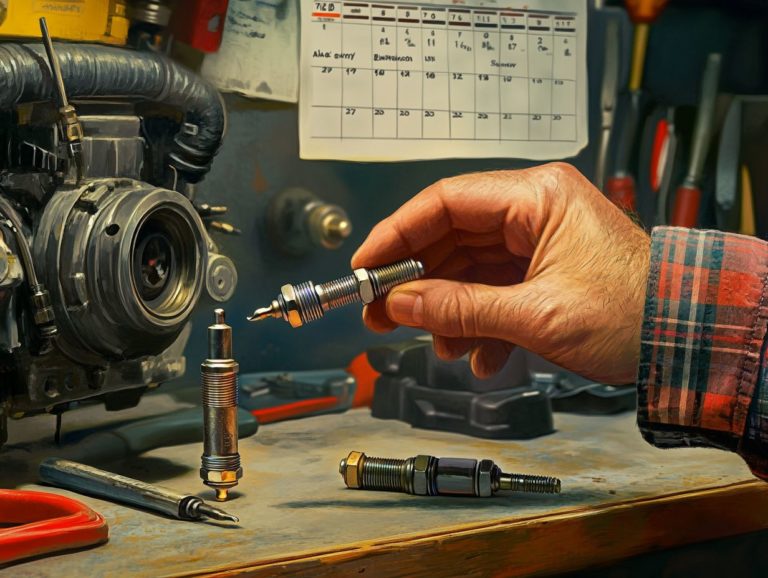The Importance of Regular Fluid Changes
Understanding the fluid changes in your body is essential for maintaining optimal health. Let s explore what these fluid changes mean for you and why you should keep an eye on them!
Uncover the advantages of balanced fluid levels, identify common factors that can influence these levels, and recognize key signs that may indicate a need for adjustment.
You ll find practical tips for staying hydrated. Don’t wait! Consult a medical professional at the first sign of trouble!
Immerse yourself in this information to learn how to take control of your health through effective fluid management.
Contents
Key Takeaways:

- Regular fluid changes are your ticket to better vehicle health and avoiding those pesky repair bills!
- Factors such as physical activity, climate, and medication can affect fluid levels and the need for regular changes.
- Signs of dehydration include thirst, fatigue, and decreased urine output; seek medical attention if these symptoms persist.
Understanding Fluid Changes
Understanding fluid changes is essential for optimal vehicle maintenance. It ensures that various fluids like engine oil, transmission fluid, brake fluid, coolant, power steering fluid, differential fluid, and transfer case fluids are kept at appropriate levels to enhance your vehicle’s longevity.
Over time, these fluids can degrade or become contaminated. This degradation can lead to potential issues affecting your vehicle’s health and performance. Adhering to regular intervals for fluid changes ensures the lubrication of critical components and helps you avoid costly repairs, keeping your vehicle reliable and safe on the road.
What are Fluid Changes?
Fluid changes involve the essential process of replacing or replenishing vital fluids in your vehicle, such as engine oil, transmission fluid, brake fluid, and coolant, which are crucial for optimal operation.
These fluids play important roles in maintaining the functionality and safety of your automobile. For example, engine oil lubricates moving parts, reducing friction and wear while dissipating heat. Without it, you d experience a decline in engine performance.
Transmission fluid helps your car change gears smoothly and protects gears from heat and wear, directly affecting your driving experience.
Brake fluid is critical for effective braking, transferring force from the brake pedal to the brake components. Any leak or degradation here can compromise your safety. Meanwhile, coolant regulates engine temperature, preventing overheating and protecting vital components.
Maintaining these fluids is essential for prolonging the life of your vehicle and ensuring efficient performance.
Why Regular Fluid Changes are Important
Regular fluid changes are essential for maintaining your vehicle’s health and ensuring it performs at its best. These changes prevent the degradation of crucial fluids, such as oil, highlighting the importance of regular oil filters and helping you avoid costly repairs.
Keeping your fluids at the proper levels ensures smooth operation and extends the lifespan of key components like the engine, transmission, and braking systems.
By sticking to a preventative maintenance schedule that includes timely fluid changes, you can significantly enhance your vehicle’s longevity and safety on the road.
Benefits for Overall Health
The overall health of your vehicle greatly benefits from regular fluid changes. This ensures that all systems operate at their peak efficiency and enhances its longevity.
By keeping the engine oil, coolant, transmission fluid, and other essential liquids at optimal levels, you can enjoy improved fuel efficiency, translating to savings at the pump. Maintaining clean fluids also helps reduce harmful emissions released into the atmosphere, supporting greener driving practices.
Timely fluid maintenance enhances your safety on the road and minimizes the risk of overheating, brake failures, or other potential malfunctions.
When these systems are well-maintained, they perform better and contribute to a smoother and more reliable driving experience overall.
Common Causes of Fluid Changes
Understanding the common causes of fluid changes is essential for proactive vehicle maintenance. Various factors can lead to fluid degradation or loss. These factors directly impact your vehicle’s performance and safety.
Environmental conditions, driving habits, and the age of your vehicle can necessitate more frequent fluid changes. By being aware of these factors, you can take the necessary steps for effective vehicle maintenance. This ensures optimal performance and prevents potential issues down the road.
Factors that Affect Fluid Levels
Several factors can influence fluid levels in your vehicle. These include environmental conditions, your driving habits, and the overall age and condition of the vehicle.
For example, extreme temperatures can cause fluid evaporation or condensation, affecting both quality and quantity. In contrast, aggressive driving like frequent braking or hard acceleration can accelerate wear and tear, depleting fluid levels more rapidly.
The age of your vehicle is another critical factor. Older cars are more prone to leaks or contamination. That s why routine checks and maintenance are vital. Keeping an eye on all fluids, from engine oil to brake fluid, helps ensure they stay at optimal levels. This safeguards your vehicle’s performance and safety.
Signs that Fluid Changes are Needed
Recognizing the signs that fluid changes are necessary is crucial for preserving your vehicle’s health and ensuring safe driving. Look out for indicators such as unusual sounds, fluid leaks, and fluctuations in engine temperature these can signal that it s time for an inspection.
Ignoring these warning signs may indicate the breakdown of important fluids. This can potentially lead to significant damage if not addressed promptly. By regularly monitoring your vehicle’s performance and fluid levels, you can catch these issues early. This allows for preventative maintenance that can significantly extend the lifespan of your vehicle.
Physical and Mental Indicators
Physical indicators like fluid leaks, darkened engine oil, and unusual noises from your vehicle can signal the need for fluid changes. Mental indicators like anxiety while driving can reflect vehicle issues.
Recognizing these signs is essential for maintaining optimal vehicle performance and ensuring a safe driving experience. For instance, a change in how your car responds to the throttle could indicate mechanical problems, such as issues with the engine or braking system, that require immediate attention. Any discomfort you feel behind the wheel may suggest that your car isn’t handling well or that something may be off with its braking or steering systems.
This underscores the importance of regular vehicle inspections and preventive maintenance. Both physical and psychological aspects significantly contribute to your vehicle’s overall performance and your comfort while driving.
How to Maintain Proper Fluid Levels
Maintaining proper fluid levels is crucial for achieving optimal vehicle performance and longevity. It requires regular inspections and timely fluid changes to ensure that every system operates effectively.
As a vehicle owner, you should establish a routine that includes checking fluid levels at consistent intervals. Replace any fluids that are low or degraded. By integrating these practices into your maintenance regimen, you can enhance your vehicle’s health and proactively prevent potential issues related to fluid deficiencies.
Tips for Staying Hydrated

While it s essential to keep an eye on fluid levels in your vehicle, don t overlook the importance of staying hydrated as a driver! Your safety and performance on the road depend on staying hydrated.
Dehydration can cloud your focus, slow your reaction times, and contribute to fatigue. It s vital to sip water regularly during your journey. Just as your car needs engine oil, coolant, and brake fluid to run smoothly, you need water to maintain your peak physical and mental prowess.
Keeping a reusable water bottle within easy reach can encourage you to take those hydration breaks. Pay attention to the signs of dehydration, like dry mouth and dizziness, and establish a hydration routine that works alongside your vehicle maintenance checks.
Regular stops not only refresh you but also give you the opportunity to check fluid levels in your car, ensuring that both you and your vehicle are operating at your best.
When to Get Help for Your Car!
Recognizing when to seek medical attention for fluid changes in your vehicle can significantly spare you from costly repairs and ensure your car s safety on the road. Certain warning signs demand immediate action.
Pay close attention to persistent leaks, unusual noises, or big changes in engine temperature; these indicators should never be brushed aside, as they may reveal serious underlying issues that jeopardize your vehicle’s health. Acting promptly at the first hint of trouble can not only prevent further damage but also enhance your vehicle’s reliability and performance.
Warning Signs and Red Flags
Warning signs and red flags like fluid leaks, strange noises, and changes in brake responsiveness should immediately grab your attention when it comes to fluid changes to ensure your vehicle’s safety.
If you smell something unusual, like burnt oil or gasoline, it may indicate overheating or fuel leakage, calling for immediate evaluation. You should also keep an eye on those pesky dashboard warning lights, especially the ones that relate to fluid levels or engine performance.
Don t overlook critical signs like a decrease in steering responsiveness or brake pedals that feel harder than usual. These may suggest that your power steering or brake fluid is running low.
Regularly checking fluid levels and their condition can save you from minor issues snowballing into significant hazards, keeping both your safety and your vehicle’s longevity in check.
Frequently Asked Questions
What does it mean to have regular fluid changes?
Regular fluid changes refer to the routine maintenance of replacing the various fluids in your vehicle, such as engine oil, transmission fluid, and coolant, at recommended intervals.
Why are regular fluid changes important?

Regular fluid changes are important because they help keep your vehicle running smoothly and efficiently, prevent breakdowns, and extend the life of your engine and other components.
How often should I have my fluids changed?
The frequency of fluid changes varies depending on the type of fluid and the make and model of your vehicle. It is best to consult your owner’s manual or a trusted mechanic for recommended intervals.
What happens if I don’t get regular fluid changes?
If you neglect to have regular fluid changes, your vehicle’s performance may suffer, and you may experience more frequent breakdowns. Over time, old or dirty fluids can also cause damage to your engine and other components.
Do I need to change all my fluids at the same time?
No, it is not necessary to change all your fluids at the same time. Each type of fluid has its own recommended interval for replacement, so it is important to follow those guidelines.
Can I change my own fluids or do I need to go to a mechanic?
Some fluid changes, such as engine oil, can be done at home with the right tools and knowledge. However, it is recommended to have a professional mechanic handle more complex fluid changes, such as transmission fluid or coolant, to ensure they are done correctly and with the proper fluids for your vehicle.
Stay alert and hydrated your journey matters!







